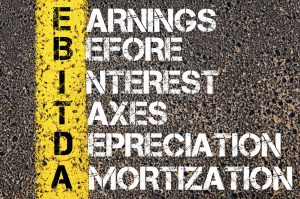What is EBITDA and Why Do I Care?
 EBITDA is an acronym for Earnings Before (deduction of) Interest, Taxes, Depreciation and Amortization.
EBITDA is an acronym for Earnings Before (deduction of) Interest, Taxes, Depreciation and Amortization.
It’s a way of evaluating a company’s operating performance without considering financing or accounting decisions, or the tax environment.
Stated another way, EBITDA is actually the operating income of the company, not affected by non-operating expenses like equipment purchases, or financing decisions resulting in additional interest expense.
Why is EBITDA important?
Are you buying or selling a business? An EBITDA calculation represents debt-free, pre-tax cash income and allows someone to compare the efficiency of a company with its competitors, minus the influence of capital structure. It’s one of the operating measures most used by analysts in commenting on a company’s financial health.
EBITDA is not the same as free cash flow, because adjustments are made to EBITDA to arrive at cash flow. For example, if the company repaid debt or purchased equipment, those transactions would not affect EBITDA. That’s why interest is added back, because it allows comparison on a debt-free basis.
EBITDA and Leveraged Buyouts
When purchasing a business in a leveraged buyout; that is, when you pay for one business with another’s earnings, EBITDA is the starting point in determining the debt repayment capacity of the target business.
- If EBITDA is low, it will not support large debt payments and the buyer will most likely offer a lower amount to purchase the business.
- If EBITDA is high, it will support more debt and the buyer therefore will be willing to pay more for the business.
This makes sense, because the purchaser of a business is paying for the expectation of future earnings. The greater the expected future earnings, the more valuable the business.
The Good News
The good thing about EBITDA is that it is in the control of management.
How can it be increased? There are two ways, and they are very simple. The first is to increase revenue, and the second is to decrease expenses. It is essential that you review your financial statements each month to identify expenses that may be reduced. Accurate monthly financial statements are one of the best tools in managing your business and increasing EBITDA. If you don’t receive timely monthly financial statements, talk to your CPA. If he or she can’t help you, call us. After all, your business won’t manage itself.




